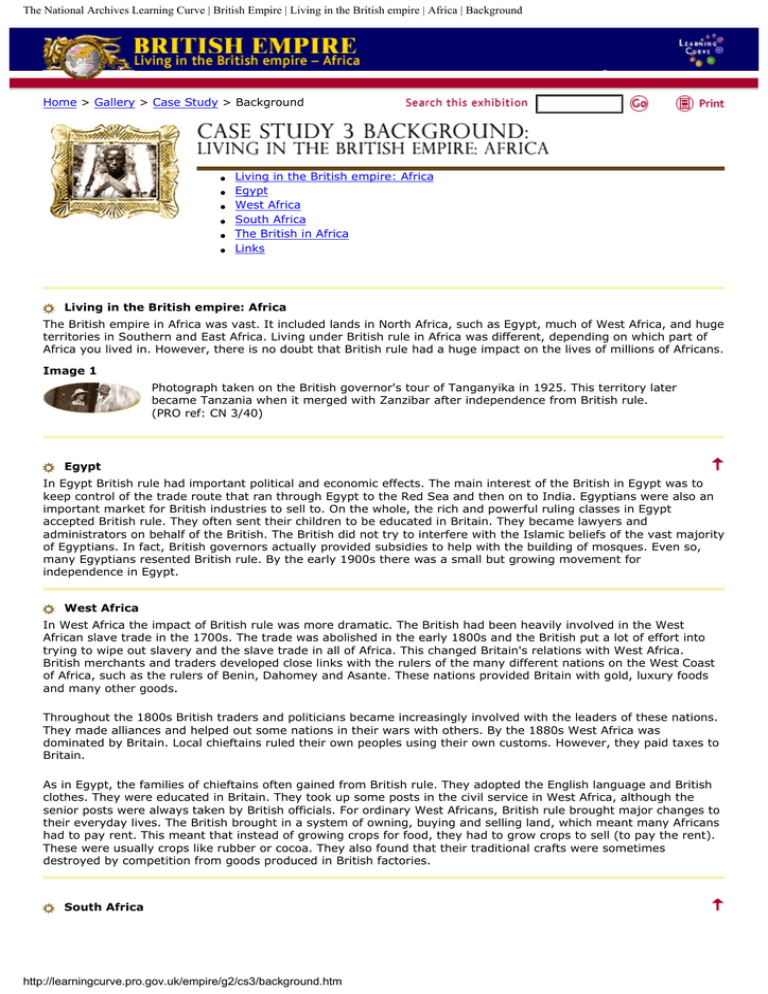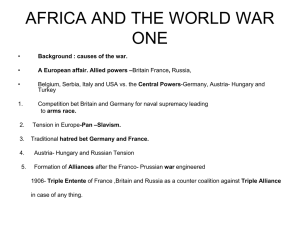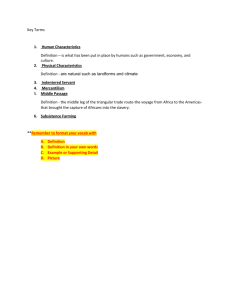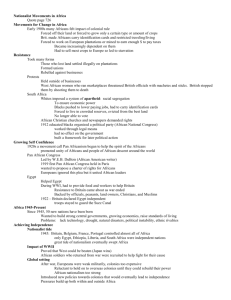Document 11401336
advertisement

The National Archives Learning Curve | British Empire | Living in the British empire | Africa | Background Home > Gallery > Case Study > Background ● ● ● ● ● ● Living in the British empire: Africa Egypt West Africa South Africa The British in Africa Links Living in the British empire: Africa The British empire in Africa was vast. It included lands in North Africa, such as Egypt, much of West Africa, and huge territories in Southern and East Africa. Living under British rule in Africa was different, depending on which part of Africa you lived in. However, there is no doubt that British rule had a huge impact on the lives of millions of Africans. Image 1 Photograph taken on the British governor's tour of Tanganyika in 1925. This territory later became Tanzania when it merged with Zanzibar after independence from British rule. (PRO ref: CN 3/40) Egypt In Egypt British rule had important political and economic effects. The main interest of the British in Egypt was to keep control of the trade route that ran through Egypt to the Red Sea and then on to India. Egyptians were also an important market for British industries to sell to. On the whole, the rich and powerful ruling classes in Egypt accepted British rule. They often sent their children to be educated in Britain. They became lawyers and administrators on behalf of the British. The British did not try to interfere with the Islamic beliefs of the vast majority of Egyptians. In fact, British governors actually provided subsidies to help with the building of mosques. Even so, many Egyptians resented British rule. By the early 1900s there was a small but growing movement for independence in Egypt. West Africa In West Africa the impact of British rule was more dramatic. The British had been heavily involved in the West African slave trade in the 1700s. The trade was abolished in the early 1800s and the British put a lot of effort into trying to wipe out slavery and the slave trade in all of Africa. This changed Britain's relations with West Africa. British merchants and traders developed close links with the rulers of the many different nations on the West Coast of Africa, such as the rulers of Benin, Dahomey and Asante. These nations provided Britain with gold, luxury foods and many other goods. Throughout the 1800s British traders and politicians became increasingly involved with the leaders of these nations. They made alliances and helped out some nations in their wars with others. By the 1880s West Africa was dominated by Britain. Local chieftains ruled their own peoples using their own customs. However, they paid taxes to Britain. As in Egypt, the families of chieftains often gained from British rule. They adopted the English language and British clothes. They were educated in Britain. They took up some posts in the civil service in West Africa, although the senior posts were always taken by British officials. For ordinary West Africans, British rule brought major changes to their everyday lives. The British brought in a system of owning, buying and selling land, which meant many Africans had to pay rent. This meant that instead of growing crops for food, they had to grow crops to sell (to pay the rent). These were usually crops like rubber or cocoa. They also found that their traditional crafts were sometimes destroyed by competition from goods produced in British factories. South Africa http://learningcurve.pro.gov.uk/empire/g2/cs3/background.htm The National Archives Learning Curve | British Empire | Living in the British empire | Africa | Background In South Africa there was a complex mix of peoples - British, Boers (descendants of Dutch settlers from the 1600s) and native African peoples like the Xhosa, the Zulu and the Matabele. The British wanted to control South Africa because it was one of the trade routes to India. However, when gold and diamonds were discovered in the 1860s1880s their interest in the region increased. This brought them into conflict with the Boers. The Boers disliked British rule. They wanted a simple farming life. British rule made their country increasingly a country of industry and business. The Boers also felt that the native Africans were inferior and should be treated as slaves. The British insisted that Africans should have rights. Despite this, they fought several wars with African peoples in the 1870s and effectively broke the power of the Zulus. Tensions between Boers and British led to the Boer War of 1899-1902. This was an extremely bloody and brutal war, which the British eventually won. However, the peace terms were generous. By 1910 the Boers ruled a South Africa that was virtually independent from Britain. This did little to help the native Africans. They had few rights under the British. They got the lowest paid and most dangerous jobs in the mines. However, when South Africa ruled itself they were even worse off. The white South Africans passed a range of laws that discriminated against them. The black African majority would not enjoy full rights in South Africa until the 1990s. Image 2 A rickshaw run by an African in the South African city of Durban around 1900. This is typical of the type of jobs that the majority of black Africans could expect to achieve. There was a small, privileged African class, but their numbers were tiny compared to the mass of ordinary Africans. (PRO ref: COPY 1/445 f.577) The British in Africa So it is difficult to make a sweeping judgement about British rule in Africa. The arrival of the British certainly disrupted traditional African culture and ways of living. It widened the gap between African chiefs and their people. It changed African economies and made them dependent on trade with Britain. The British invested in the development of roads and railways. They brought new ideas about education and medicine (although they also brought diseases with them). British officials generally treated the Africans better than the settlers who were left behind when the British pulled out. The British were also generally more tolerant of local religions and customs than other European rulers. The British put enormous resources into combating slavery. The Royal Navy stopped slave ships, raided the camps of slave traders and co-operated closely with the navies of other countries in the campaign against slavery. In 1841 the British government negotiated treaties with Prussia, Holland, Denmark, France, Austria and Russia in which the powers all agreed to combat slavery. After slavery was abolished in the USA (in 1865) the British and American navies worked out detailed plans to catch illegal slavers. British missionaries and explorers, with the help of British officials and the military, worked tirelessly to stop the slave trade from East Africa to Arabia. Against this, some historians argue that fighting slavery, building railways etc simply helped Britain's trading interests. Links Britain in the World http://www.pro.gov.uk/pathways/census/events/britain3.htm Outline of British rule in Africa - part of the National Archives' Britain in 1901 site Cape Connected http://www.capetown.at/heritage/history/british.htm Outline of British rule in South Africa Feedback | Credits | Sitemap | Help http://learningcurve.pro.gov.uk/empire/g2/cs3/background.htm Glossary | World Maps Background source 1 Print | Close Photograph taken on the British governor's tour of Tanganyika in 1925. This territory later became Tanzania when it merged with Zanzibar after independence from British rule. (PRO ref: CN 3/40) Top of page | Print | Close http://learningcurve.pro.gov.uk/empire/g2/cs3/g2cs3s1_bg.htm Background source 2 Print | Close A rickshaw run by an African in the South African city of Durban around 1900. This is typical of the type of jobs that the majority of black Africans could expect to achieve. There was a small, privileged African class, but their numbers were tiny compared to the mass of ordinary Africans. (PRO ref: COPY 1/445 f.577) Top of page | Print | Close http://learningcurve.pro.gov.uk/empire/g2/cs3/g2cs3s2_bg.htm



